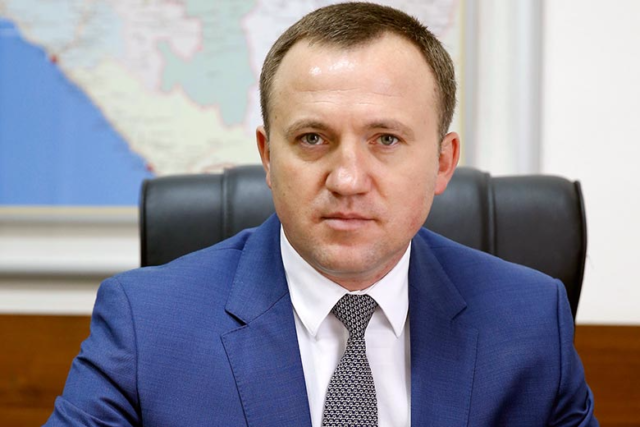
Kuban Corruption Case Could Presage New Source of Legitimacy for Kremlin
Publication: Eurasia Daily Monitor Volume: 14 Issue: 22
By:

One news story has been dominating headlines in Russia’s Krasnodar region (also known as Kuban, after the main river) for weeks: that of the alleged embezzlement of funds originally designated for the building of a perinatal clinic in Sochi. The funds were awarded under the program “Health Modernization in Krasnodar Krai 2016–2020.” The construction company “Kuban” won the contract to build the first stage of the clinic for a cost of 1.6 billion rubles ($28 million). The project had an estimated overall price tag of over 2 billion rubles ($35 million), with 1.7 billion ($29 million) coming from Moscow and the remainder from the regional budget. The allegations surround Kuban Universal Bank, which was going to act as a middleman for the budget funds and held 200 million rubles ($3.45 million) deposited for the first stage of the construction. However, when the bank declared bankruptcy in January 2017, the money had vanished. The bank’s license to hold and lend money had been revoked in October. Critics have alleged that officials chose to use the failing bank specifically in order to steal money from state coffers. The regional administration is a 98 percent owner of the bank and was its founder in 1994 (RBC, February 1). Paradoxically, the central government’s response to this massive corruption case may serve as a means to boost the domestic legitimacy of Vladimir Putin’s regime ahead of next year’s presidential elections.
According to local sources, the Russian Federal Security Service (FSB) interrogated the regional deputy governor, Yuri Gritsenko, on January 30. Gritsenko’s portfolio specifically included local government oversight of construction projects. Moreover, federal security officials seized boxes of documents from the offices of the regional administration. The FSB has reportedly opened a criminal case under article 201 of the Russian Criminal Code (abuse of authority in a commercial organization). Media accounts differ as to whether prosecutors have charged Gritsenko yet. But it seems unlikely that the Krasnodar deputy governor was unaware of the perinatal clinic corruption scheme as it unfolded. Nonetheless, he has not yet been detained, and apparently was still at work on the afternoon of January 30 (Kommersant, February 1). Other sources speculate that the FSB activity has more to do with delays in preparing the Fisht Stadium—used during the 2014 Sochi Winter Olympic Games—for the 2018 FIFA World Cup. Indeed, compared to a single medical clinic, the stadium retrofit in preparation for the World Cup is altogether a bigger and more prestigious project (Newsland.com, February 2). Whatever the truth of the allegations, the case contains parallels with other recent developments in Kuban and Russian politics more generally.
Krasnodar Krai is becoming a poster child for interventions into regional affairs by the central government. Krasnodar is infamous for the 2010 “Tsapok massacre,” which occurred in the local stanitsa (village) of Kuschevskaya. In this deadly incident, local thugs, who had been operating with impunity partly because they enjoyed the unofficial protection of the regional administration, finally went too far by raping and murdering a total of 12 people. The ensuing outcry led to the Russian prosecutor general dismissing the local investigators and prosecutors as well as the ensuing arrest and punishment of the gang members (Vzglyad.ru, November 5, 2010). Similarly, last year, local farmers in Krasnodar (one of the most fertile agricultural areas of the Russian Federation), led a series of protests against the raiding practices of local elites, who had forced farmers to sell land at extremely low prices. The farmers drove a convoy toward Moscow, but were stopped along the way in Rostov and prevented from continuing. In September, they published an open letter to President Vladimir Putin in a national newspaper, where they called for instituting substantive changes to property rights legislation in the krai (Jamestown Foundation blog, September 21, 2016). Thus, instances of corruption and injustice in the southern region—and their successful prosecution or tackling by Moscow—have proven particularly useful for showing the regime in a positive light.
Indeed, a seeming crackdown on corruption in Russia appears to be in the offing. The most famous case in recent times was the November 2016 arrest of Alexei Ulyukaev, then minister for economic development of the Russian Federation. Uluykaev was arrested for allegedly receiving a $2 million gift in exchange for his support for the attempted acquisition of Bashneft by Rosneft, run by Igor Sechin. The bribe was presented to Ulyukaev on November 14, while the suspect had been under surveillance by the FSB for an entire year. Ulyukaev’s detention was noteworthy not just because it represented the first recent arrest of a sitting Russian minister but also because it purportedly revealed infighting by the Russian elite between the liberal and statist camps (see EDM, November 17, 2016). Although, Ulyukaev’s arrest was initially understood as overt evidence of internal maneuvering between elite groups, later government investigations like the case of the Sochi perinatal clinic may point toward another explanation. Together, these cases suggest that the state’s apparent increasingly rigid stance against corruption is actually turning into a political resource for President Putin. Part of Putin’s ability to successfully mediate between the competing camps in the Kremlin is due to his public appeal and aura of popularity among the Russian population. But this also lends his regime greater legitimacy when it takes the form of high-profile legal cases (Hutcheson & Petersson, “Shortcut to Legitimacy: Popularity in Putin’s Russia” Europe-Asia Studies 2016, volume 68 issue 7). Highly publicized anti-corruption prosecutions go a long way toward realizing the “good Tsar, bad boyars” explanation for problems in Russia such as the economic crisis. If this explanation is correct, one can expect to see more high-visibility prosecutions throughout the Russian Federation in the months ahead.



